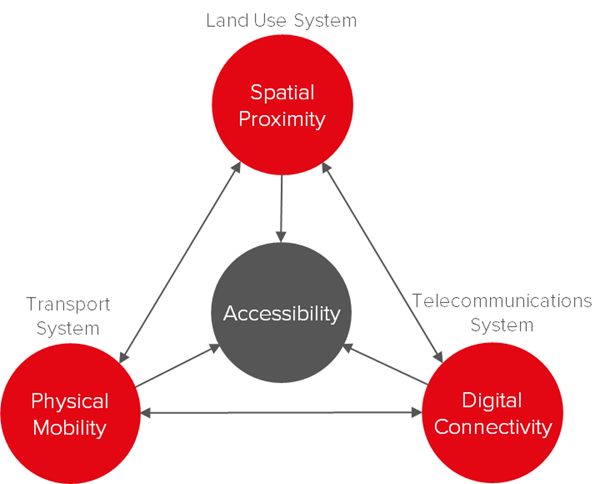Conventional approaches to mobility planning, based on the forecast-led paradigm, have led to unrealised expectations concerning alleviating problems such as congestion and delivering economic, social and environmental outcomes.
Breaking news: The Triple Access Planning for Uncertain Futures – A Handbook for Practitioners is now published!
Research shows plans become rapidly obsolete and lack resilience with regard to future developments. The research project Triple Access Planning for Uncertain Futures aims to improve Sustainable Urban Mobility Plans (SUMPs), addressing both the movement of people and goods, through two significant new considerations:
- Triple Access Planning (TAP) – future sustainable urban accessibility can be achieved through the transport system (physical mobility), the land-use system (spatial proximity) and the telecommunications system (digital connectivity); together constituting a Triple Access System (TAS).
- Accommodating uncertainty – unpredictable change dynamics such as demographics, economic developments, locational choices, regulatory context, technological breakthroughs, travel demand, and stakeholder behaviour can be explicitly taken into account in the plan, in terms of development and implementation.

Triple Access Planning for Uncertain Futures is a three-year pan-European project, running between May 2021 and April 2024.
The project will critically examine existing urban mobility planning, and advance guidance to improve the resilience and adaptability of sustainable urban mobility plans (SUMP) in the face of uncertainty. Central to the work is a focus upon the tripartite contribution to accessibility in our towns and cities of physical mobility, spatial proximity and digital connectivity.
Blog: TAP Perspectives
Consortium
Triple Access Planning for Uncertain Futures is carried out in collaboration among five academic institutions, seven European case study cities, two national transport agencies, and two consultancy firms. The project has received funding from ERA-Net Cofund Urban Accessibility and Connectivity (ENUAC), in collaboration with individual funding partners in the participating countries.
Academic partners
University of the West of England, UK
Radboud University, Netherlands
Urban Planning Institute, Slovenia
KTH, Sweden
University of Cagliari, Italy
National transport authority partners
Transport Scotland
Swedish Transport Administration
Case study city partners
Bristol City Council
Aberdeen City Council
Nijmegen City Council
City of Utrecht
City Municipality of Nova Gorica
Norrköping Municipality
Cagliari Metropolitan Council
Consultancy partners
Mott MacDonald
Panteia
TAP in policy and practice
The Triple Access System has recently been explicitly considered in several public transport policy processes:
- The perspective is mentioned in the Local Transport Plan Green Paper Reimagining transport in the West Midlands: a conversation about change (2021), published by Transport for West Midlands, United Kingdom.
- TAS is considered as part of final recommendations to mitigate congestion in a commissioned report carried out by South East Wales, UK.
- The South East Wales Transport Commission, which was set up after the Welsh government cancelled a planned new M4 motorway with the task to consider alternatives, refers to TAS in their final recommendations report.
Receive website updates
To receive an update on blog posts and other content on the website twice annually, please provide your e-mail address.
